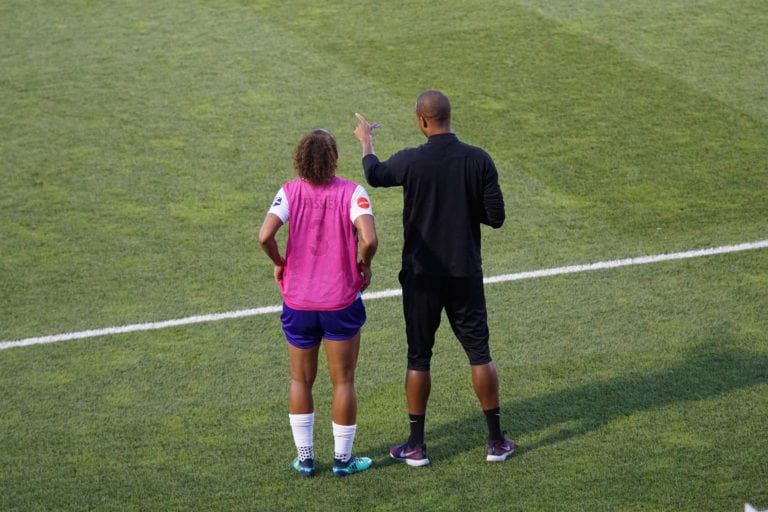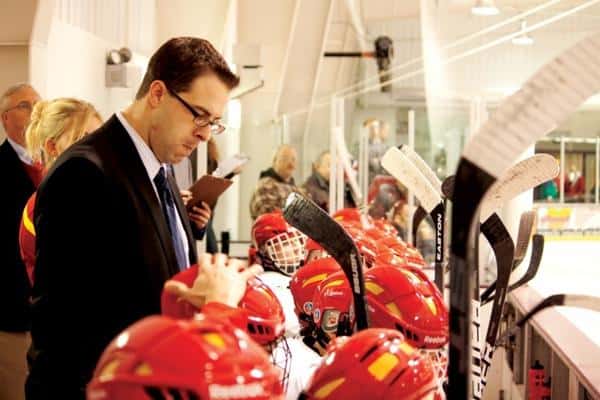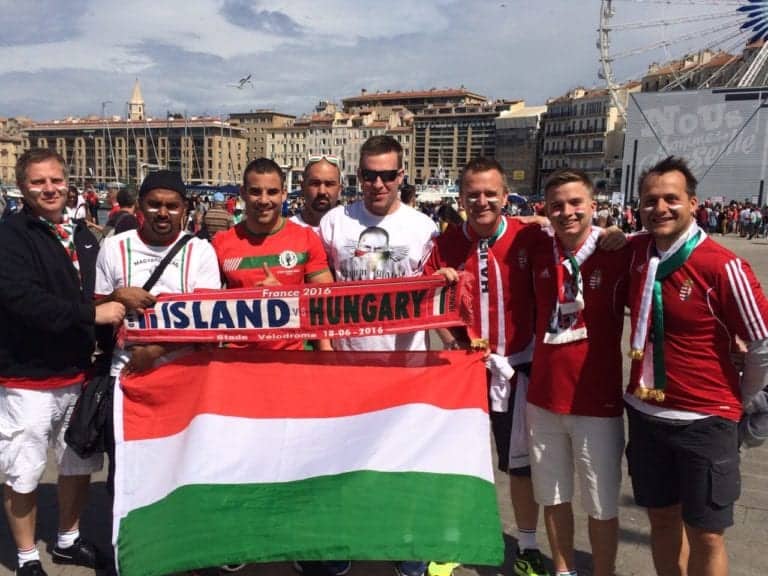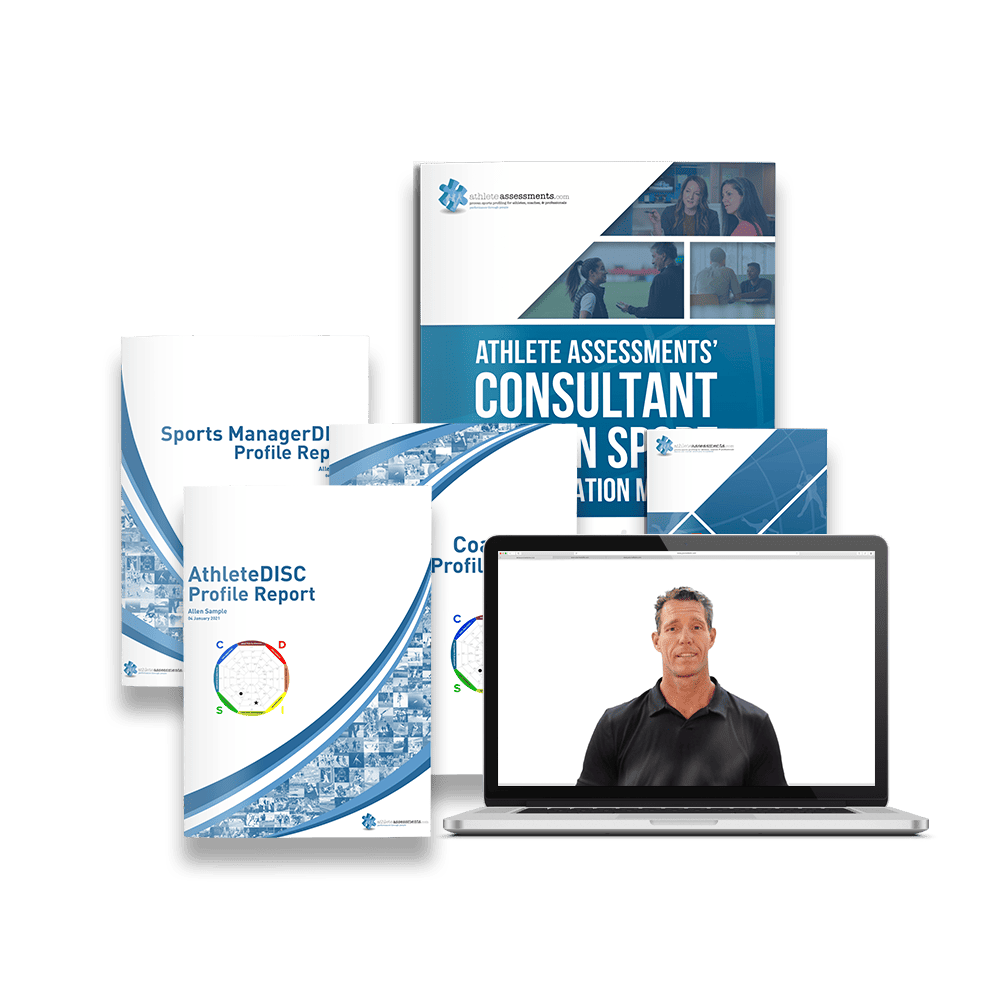“Get one day better every day.
Have clarity on what that ‘one day better’ actually is each day.
The daily accumulation of improvement increases the likelihood that you’ll reach your goals.”
That’s one of the foundational philosophies that mental performance coach Jeff Troesch, shares with athletes and coaches. In a career spanning 32 years, Jeff works with Olympians, professionals, collegiate teams and individuals, including athletes who are talented enough and work hard enough, to become world #1. He has accumulated a tremendous amount of knowledge in that time, knowledge which he generously shares with his clients and in this interview, we’re given the rare opportunity to go inside improvement alongside him.
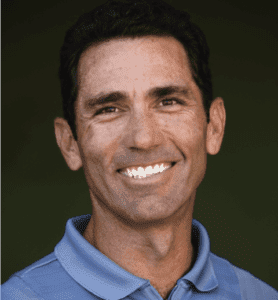
Jeff regularly guides coaches and athletes to move from a reactive (i.e. crisis management) approach towards a proactive state when it comes to mental performance. We wanted to know more about the mechanics of this shift and its impact on athletes. So, we asked Jeff and he said “I have always been a strong advocate of the notion that you ‘don’t have to be sick to get better’ and a proponent of a wellness model for skill development.”
When it comes to the advantages of developing mental skills in athletes, Jeff says “Early exposure to an array of tools and skills can often equip an athlete or a coach with requisite remediation for commonly occurring issues in sport.”
“The sooner a client is aware of how to identify possible mental/emotional challenges in their sport, and the stronger the habit formation of helpful strategies, the better. This generally takes a fair amount of time and practice, and the skill acquisition is frequently enhanced when an athlete learns this prior to being in ‘crisis mode’.’’
In fact, Jeff tells us that the development of mental skills is widely misunderstood. Elaborating, he says that people often think he works in a clinical setting on mental illness and/or that athletes only benefit when they have a ‘problem’. He says, “those that understand know that being proactive, skill building and doing wellness education is how I can make my most significant impact.”
Jeff works with such a broad spectrum of athletes and coaches in different settings, he says, “There honestly isn’t a ‘typical’ as I get referrals from a multitude of sports, with athletes at all levels and referred to me via a wide array of avenues. Probably most generally true is that I meet with the athlete, go through some sort of assessment process to help me get a sense of background information and perceived need, and then collaborate with the client to formulate a plan of action. This action plan often begins with an education process wherein I expose the client to the fundamental models from which I work and from which my philosophy is drawn. After that, it is often an on-going regimen of conversations, training and/or competition observations, and providing homework/recommendations for growth and development.”
Knowing that a mental performance coach can work in so many different areas we were curious about what things athletes frequently sought help with. Jeff says, “Among the most common are – competitive anxiety, confidence challenges, focus issues, difficulty in managing expectations or failures, inconsistency in performance, struggles with taking practice/training successes into the competitive arena, communication with members of their staff/team/entourage.”
When it comes to the content of those sessions Jeff describes his approach, “One of my primary philosophies is to be transparent and authentic with my clients. It does not serve them well for me to tell them what I think they want to hear or what I think will make it easy or gentle on them.
“I feel like I honor my clients if I give them an honest mirror into which they can reflect.
“Additionally, I believe strongly that we make a choice as to what we think and that building strong habits of awareness and discipline regarding thought is necessary- necessary but not sufficient. I believe that alongside this is a necessity to put emphasis on action- as great thoughts without attendant action is nearly worthless in competitive athletics.”
Enter the ‘get one day better every day’ philosophy, but Jeff adds, “Emphases on those outcome goals often distract or emotionally paralyze athletes and coaches.“
Further, Jeff considers the number one issue that his clients face and work to overcome is “Fear of failure that comes through trying to satisfy other’s agendas and/or through unfavorable comparisons of themselves to others.”
He explains what happens when athletes are able to shift their focus from outcomes to process, he says, “Athletes become more disciplined with their thoughts, more accountable for their actions, and more realistic and focused on the daily tasks. This in turn often decreases anxiety, improves focus and intention, and translates into a more enjoyable experience toward mastery of their craft.”
Anxiety is an escalating problem for elite athletes (and the broader population), the International Olympic Committee recently issued an advisory asking everyone associated with high-performance sport to consider upgrading the mental environment that athletes train and compete in, accordingly we want to share Jeff’s thoughts on anxiety. We asked him about managing anxiety within a sports program or for individual athletes, he says, “The answer to this varies widely depending on the genesis and etiology of the anxiety. Mindfulness training (relaxation, meditation, deep breathing, prayer, etc.) is one of the tangible modalities that I recommend.”
“However, my experience has been that much of anxiety is triggered by thoughts that are non-productive and are perpetuated by habits which are unhelpful or unhealthy.
Helping athletes explore the foundation of their anxiety and helping them gain awareness about how they are complicit in perpetuating their anxiety is a significant part of my journey alongside many of them. Then it is about assisting in the creation and utilization of more healthy habits of thought and action.”
Jeff talks about this process of working with athletes and says, “I get excited about watching people grow. It has been a humbling and rewarding experience to be alongside literally thousands of athletes and coaches over three decades and being witness to the transformations that take place in people’s lives and sport experiences as they make improvements and put additional tools in their metaphorical toolboxes.”
Developing these critical mental skills is the foundation of success in sports programs and individual experience. We’ve seen the way that developing mental skills and knowing how to apply them makes a difference to athletes and coaches. Jeff’s clients regularly refer to the 911 experience where an athlete calls Jeff in crisis, while he explains that this will always be a part of his work, he is working with his clients to shift them to a more proactive approach. The process of translating mental skills is important, they need to be relevant, easy to understand and easy to apply. To put it simply, Jeff says that his clients say, “I am like a jock who knows mental training, instead of a psychologist trying to speak the language of sport.”
We know that Jeff’s services are in demand! and we were talking about how he intends to meet this demand. He says, “My main focus today is working with Division 1 NCAA programs and athletes and assisting them in building strategies for peak performance. Building cultures, enhancing team cohesion, improving efficiencies and effectiveness to progress toward their goals.”
“My future work is going to involve more ‘train the trainer’ as I consult more frequently with coaches who benefit from my exposure to so many great coaches and successful teams. I also intend to utilize the (Athlete Assessments) DISC Profiles much more in the future as I’ve seen the immediate impact with nearly all of the clients with whom I’ve used the Profile.”
One of the people Jeff will do more work with is Tim Bayley. Jeff tells us a little about Tim, “Tim Bayley is a former high-level international athlete, and professional and collegiate coach. Tim is a certified DISC consultant (through Athlete Assessments) and recent recipient of a Master’s Degree in Sport Psychology. I have been mentoring Tim to translate his personal experience and his deep caring of people and sport to assist teams, coaches, athletes, and athletic organizations to prepare and perform optimally.”
On that note, Jeff explained, “I am most proud of the mental trainers and coaches around the world who are utilizing the philosophies that I helped them formulate to positively impact athletes and sports organizations.“
Acknowledging the way mentoring another mental coach is different to working in the field Jeff says, “My career highlight is the first time one of my tennis players achieved reaching #1 in the world.” But, putting this in perspective he says, “I have had a multitude of athletes that have risen to #1 in the world in their respective sports, won Gold Medals at Olympic Games and World Championships, won National Championships and broken world records. However, what highlights the work that I do, is a drawer in my home that is filled with letters, cards, and emails from athletes, coaches, and family members of athletes or coaches who have written to thank me for the impact I’ve had in their lives. Besides my daughter’s photos and my marriage certificate, these are my most precious possessions.”
When this opportunity arose to interview someone as committed to improvement as Jeff, we were keen to ask him about his own process of personal development. He told us that the learning involved with becoming a certified consultant and utilizing Athlete Assessments’ DISC Profiles had made a significant difference to his work.
Expanding he says, “Working with Athlete Assessments’ DISC Profiles expedites the self-awareness process for clients and allowed our discussions to be richer and deeper much more quickly. The insight gleaned has assisted the athletes and coaches to recognize their behavioral tendencies and to have a plan of action to make beneficial adjustments. It has also significantly enhanced the quality of discussions regarding relationships and interactions between and among players and coaches.”
Making the most of Jeff’s extensive experience, we asked him what advice he’d give to someone starting out in their career as a consultant or sport psychologist? He says, “There is no shortcut to being successful. Be ready to work your tail off and be humble enough to be grateful to work with any athlete or coach willing to work with you. Make sure you’re clear about the limits of your knowledge and your expertise. Work in a collaborative manner with coaches and athletes. Get as much hands-on experience as you possibly can. What you learned in school is helpful, but what you learn actually doing the work is what will make you successful.”
We covered so many interesting topics during this interview that we decided to include an extended Q&A with Jeff so you can benefit form his valuable insights. Read the Q&A from the interview here.
Where to from here?
Are you a consultant looking to take your clients performance to the next level? Our consultant clients are based all over the world, so no matter where you’re based, here’s some more information about our consultant’s packages.
As a top consultant, your clients rely on you being the best in your field, knowing the true determinants of success and having access to the tools that will make the most impact when it comes to improving performance. Athlete Assessments’ DISC Profiling is the tool you need to help your clients realize their potential.
At Athlete Assessments we’re here to provide you with excellence in service and to help you be your best. If there is anything we can do to be of service, don’t hesitate to contact us.
Recommended Articles
Every time an athlete, coach or team strives to better their performance, they analyze themselves in action, identify areas to improve upon and make plans for change...
The sooner a client is aware of how to identify possible mental/emotional challenges in her sport, and the stronger the habit formation of helpful strategies, the better. This generally takes a fair amount of time and practice
Why would you leave a gap in your game preparation, asks Kyle McDonald, Mental Performance Consultant. He questions why some athletes and coaches have a plan for physical and technical development, but not for mental growth and mastery. Kyle prepares some of Canada’s best and most competitive ice hockey athletes and teams for their professional, Olympic and Paralympic campaigns. In this article he reveals the impact of stress and pressure resilience on performance and underscores it as the #1 differentiator between elite athletes. He details the essential precursor to mental skills acquisition, the link between hardiness and high-performance and the ideal age to start mental skills training.
Szombathely might be 15,588 kms from the Sunshine Coast, but it’s home to our newest consultant client, Szabolcs Hollósi. Experienced in brokering change, Szabolcs now has the tools and resources to partner with Hungarian sport on a national level, creating opportunities for athletes and coaches to take their performance to exciting new heights based on DISC Behavioral profiling.



